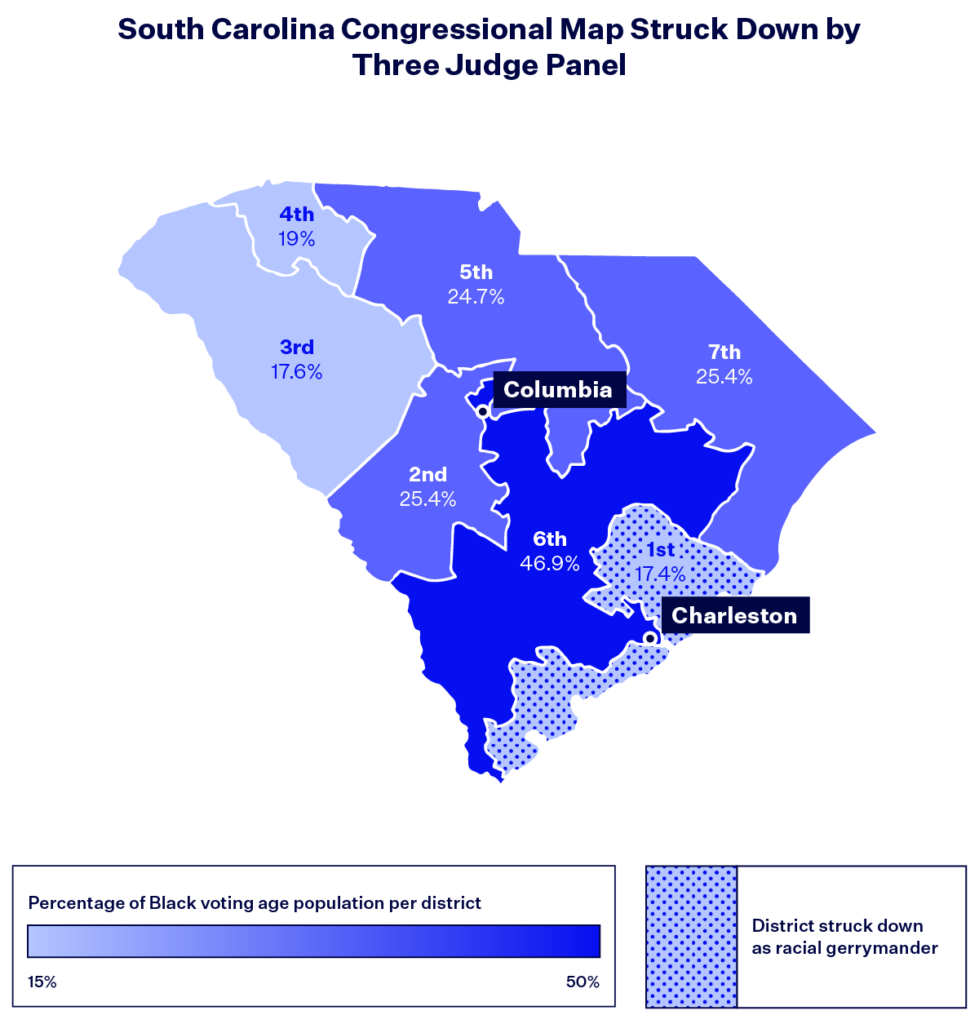South Carolina Will Use Gerrymandered Congressional Map in 2024, District Court Rules
WASHINGTON, D.C. — The same federal court that struck down South Carolina’s congressional map for being an unconstitutional racial gerrymander ruled today that the state can use the map in the upcoming 2024 elections.
This decision comes after Republican officials asked the court to pause its January 2023 decision that blocked the map and ordered a new one for 2024. Today’s order states that because the June 11 primary is rapidly approaching and a new map is not in place, “the ideal must bend to the practical.”
South Carolina voters have gone over a year without a fair congressional map. With today’s order, justice is delayed once again to Black voters in the state. The U.S. Supreme Court has yet to issue its opinion on the merits, which the court cites as a reason for this delay.

After the release of 2020 census data, the South Carolina Legislature enacted a new congressional map.
In January 2022, the Republican-controlled South Carolina Legislature passed a congressional map that drastically changed the composition of the state’s 1st and 6th congressional districts. The South Carolina State Conference of the NAACP and a voter filed a lawsuit challenging the congressional map, alleging that the map was an unconstitutional racial gerrymander in violation of the 14th and 15th Amendments.
The South Carolina branch of the nation’s oldest civil rights organization argued that the Legislature’s action was “the latest example of a decades-long pattern by the Legislature of proposing or enacting congressional districts that discriminate against Black South Carolinian voters to limit their electoral opportunity.”
The case went to trial in fall of 2022 and soon after the district court sided with the plaintiffs and struck down the map.
South Carolina gerrymandered over 30,000 African American voters in a single county, according to the three-judge panel.
The three-judge panel that heard the case struck down the map after finding that “race was the predominant motivating factor in the General Assembly’s design of Congressional District No. 1 and that traditional districting principles were subordinated to race.”
The court held that creating South Carolina’s 1st Congressional District, currently held by Rep. Nancy Mace (R), would have been “effectively impossible without the gerrymandering of the African American population of Charleston County” and that the “movement of over 30,000 African Americans in a single county from Congressional District No. 1 to Congressional District No. 6 created a stark racial gerrymander of Charleston County.”

The court ordered the Legislature to present a remedial map, but Republicans appealed the entire decision to the U.S. Supreme Court, which has issued 11 opinions so far this year but continues to stall the process by refusing to issue its decision in this case.
Since the plaintiffs challenged the constitutionality of the South Carolina congressional map under the 14th and 15th Amendments this case was directly appealable to the Supreme Court, which had to accept the appeal and rule on the merits of the case.
After the map was struck down, Republican officials asked the U.S. Supreme Court to reinstate it.
Republican legislators appealed the panel’s January decision to the Supreme Court and asked the nation’s high court to reverse the decision and reinstate the gerrymandered map.
In May 2023, the Supreme Court announced that it would review the case on its full merits docket next term, with full briefing and oral argument. All the while, voters in the Palmetto State still did not have a fair congressional map.
The Court heard oral argument in mid-October of last year when the parties asked the Supreme Court for a decision by Jan. 1, 2024. Nearly three months later, the Court still hasn’t ruled on the case, creating a dire situation for congressional candidates as the candidate filing period started on March 16 and will end on Monday.
As we await a decision from the nation’s highest court, Republicans asked both the district court and Supreme Court to allow the state to use the struck down map for the 2024 elections.
In the U.S. Supreme Court, citing the Purcell principle, Republicans argued in a brief to the Supreme Court that implementing a new map so close to the 2024 elections would bring about confusion and disorder, despite having ample time to produce a remedial plan. In response, the South Carolina NAACP, which brought the case, pointed to the thirteen months of legislative inaction.
The Legislature could have implemented a new congressional plan, the NAACP noted, “without disturbing the June 11 primary and November 5 elections” and argued that the state’s arguments against adopting a new map were “overblown, contrary to the trial record, and inconsistent with their prior request that this Court issue a decision by January 1, 2024.” There is still plenty of time to draft and enact a new map, the plaintiffs concluded.
The two plaintiffs went beyond court filings to voice their discontent with the latest development in the case. In a press release issued on Monday, Brenda Murphy, president of the South Carolina NAACP, urged the Legislature to “prioritize the integrity of our democracy by enacting a new map created in fairness for all voters” and Taiwan Scott, a longtime South Carolina voter, added, “We cannot allow delay tactics to impede progress towards fair and equitable representation in our democracy.”
While the nation’s high court has yet to respond to the Republicans’ request and rule on the merits of the case, today’s order from the district court means South Carolina voters will not have a fair map before 2024.
The order concludes: “The present circumstances make it plainly impractical for the Court to adopt a remedial plan for Congressional District No. 1 in advance of the military and overseas absentee ballot deadline of April 27, 2024 mandated under federal law and the party primaries scheduled for June 11, 2024.”
The district court itself acknowledges that it is the same court that struck down the map for being an unconstitutional racial gerrymander, but still ruled today that voters will have to be subject to this unconstitutional map for 2024.
The U.S. Supreme Court will still have the final say on the merits of this case and could block the map for 2026 and future elections.